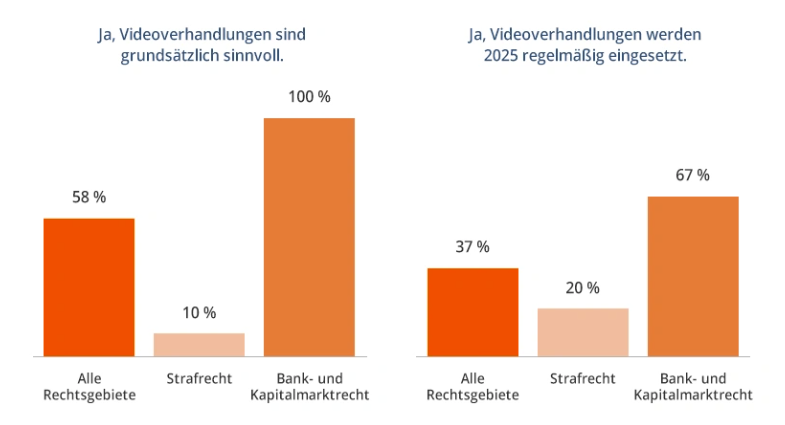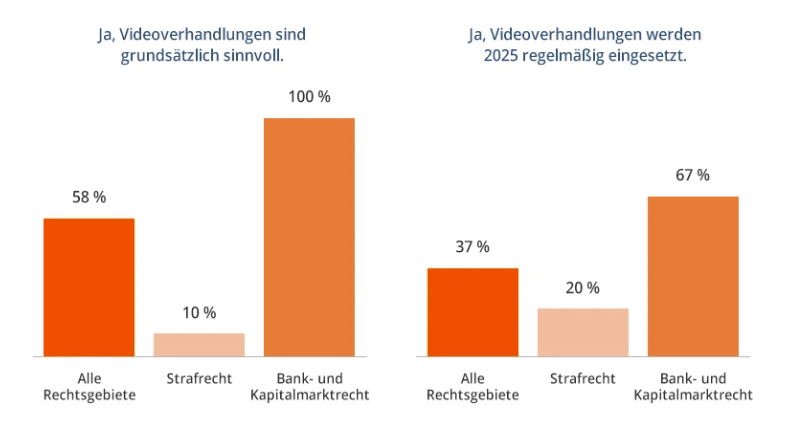The legal basis for virtual main hearings has existed for a long time, yet they are little used. Lawyers are in favor of digital hearings in principle, but it also depends on the area of law. The biggest hurdle in practice is the availability of suitable hardware in courtrooms.
The defamation trial between actor Johnny Depp and his ex-wife and actress Amber Heard was one of the most media-rich court hearings in recent years. It was streamed on all social media and had some bizarre moments.
One of those moments was the testimony of Alejandro Romero, a receptionist at Depp's apartment building. Romero was connected via video camera and answered the lawyers' questions from his car, e-cigarette in hand.
In fact, however, Romero was not invited as an entertainment guest, but for legally binding testimony.
Legal basis for digital court proceedings
Since the Corona pandemic, video-calling witnesses is no longer a rarity in Germany. However, the legal basis for this existed long before.
Since 2002, courts have been able to allow the parties to the proceedings to connect via video and audio transmission. Since a reform of Section 128a (1) and (2) and Section 185 (1a) GVG in 2013, this no longer even requires the consent of other parties to the proceedings.
There are no special requirements regarding the form of such an online negotiation. It is only necessary to ensure that the online participants can see and hear all other participants in the room at all times and, conversely, that all presence participants can hear and see the online participants at all times.
In addition, the court itself must be in full attendance in the courtroom.
Digital main hearing: civil proceedings vs. criminal proceedings
§ Section 128a of the Code of Civil Procedure applies to all hearings within the scope of the Code of Civil Procedure.
Video interrogations are also used in criminal trials, but here their application is controversial. For example, in the case of sexual offenses, it could be a burden for the victims if the testimony were recorded.
In civil proceedings, there is nothing to stop everything that the parties agree to being done digitally, said Katrin Helling-Plahr, legal policy spokeswoman for the FDP parliamentary group. In criminal proceedings, she said, it might be a bit more complicated.
In order to create clarity, Federal Minister of Justice Bushman announced a draft law in early 2022. The coalition agreement of the traffic light government states:
"We are making criminal trials even more effective, faster, modern and practical, without curtailing the rights of the accused and their defense. Interrogations and main hearings must be recorded in picture and sound."
Lawyers are in favor of digital main hearings in principle
The majority of the legal profession is in favor of digital main hearings. According to a survey conducted by the website anwalt.de, 58 percent of the lawyers questioned consider court hearings by video conference to be sensible.
However, it depends on the area of law: While almost all lawyers in banking and capital markets law are in favor of digital interrogations, 90 percent of respondents do not consider digital procedures to be useful in criminal law.

In principle, it can be said that digital interrogations make more sense the more economic interests are in the foreground - for example, in the case of a hearing in a fine proceeding. In the case of personal conflicts such as violent crimes, on the other hand, they make less sense.
Advantages and disadvantages of digital main negotiations
The advantage of interrogations via videoconference are faster procedures, easy cross-border interrogations and they reduce the inhibitions for witnesses to testify at all.
In addition, they reduce the carbon footprint of litigation and delays can be avoided because no travel costs are incurred and no time is lost on the lawyer's side.
The disadvantage is that, in contrast to personal examination, the direct impression of the witness cannot be recorded to the same extent.
Hardware remains challenge for digital master negotiations
Although the majority of lawyers consider digital processes to be correct in principle, just under two-thirds of the lawyers surveyed by anwalt.de do not expect video conferencing to become standard practice in the next five years.

Only ten percent of respondents have already participated in a court hearing with digital interrogations.
The problem here is not the legal basis, but the technology: in many places, the necessary hardware is lacking in sufficient numbers.
In terms of software, common cloud solutions such as Zoom or Microsoft Teams are often used. In principle, these solutions are permissible, but specialized solutions can offer a significantly more extensive range of functions.
FOM software for digital main negotiations
FOMs can provide the necessary structure for court hearings.
- Agenda templates can guide you through various process flows.
- Presentation tools allow you to show graphs, tables or evidence.
- Automated protocols facilitate follow-up.
- The quality of the participants' Internet connection is documented so that no one can unjustifiably claim afterwards that they were unable to participate in the process for technical reasons.
Often, FOM software can also be integrated with common video call software such as Zoom. This makes it easier for users - especially witnesses - to handle the call, as they can dial in with their usual software.
The software requirements can be met relatively easily by courts using FOM software. The legal basis also exists. Only the equipment of the courts with the necessary hardware is still an obstacle for the digital main hearing.







